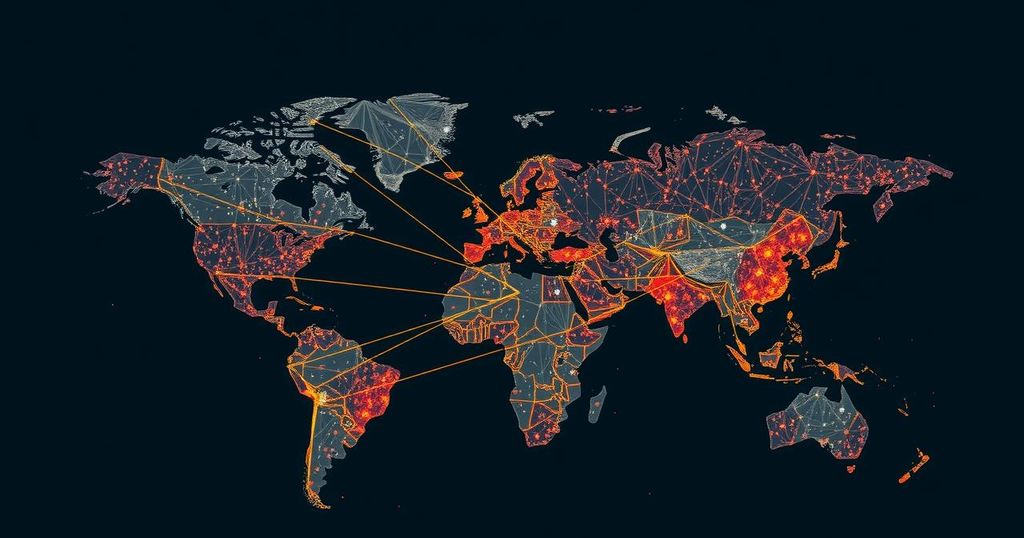The Disturbing Correlation Between Climate Change and Authoritarianism
The article discusses the alarming trend of rising authoritarianism linked to climate change, spotlighting the case of Super Typhoon Yolanda in the Philippines, which facilitated Rodrigo Duterte’s rise to power. It explores the broad phenomenon where natural disasters enable autocratic leaders to consolidate power and presents recent studies showing a connection between climate threats and authoritarian inclinations among the populace. Amid these challenges, the piece emphasizes the importance of active political engagement to protect and promote democratic values.
In November 2013, Super Typhoon Yolanda struck the Philippines, inflicting catastrophic damage with winds reaching 235 mph and resulting in a significant loss of life. Rodrigo Duterte, the mayor of Davao City at the time, gained notoriety for his harsh remarks about looters and proceeded to leverage the disaster as a platform in his subsequent presidential campaign, which he won in a landslide. Duterte’s presidency from 2016 to 2022 was marked by ruthless policies, including a war on drugs resulting in estimated deaths upwards of 30,000 and the imposition of martial law in Mindanao for two and a half years. Experts posited that Yolanda created a backdrop of crisis that facilitated Duterte’s ascent, reflecting a broader trend of authority consolidation amid climate-related disasters. In various countries worldwide, including India, Brazil, and the United States, similar authoritarian figures emerged or gained traction, often during or following environmental calamities. While these leaders did not necessarily rise to power after events as severe as Typhoon Yolanda, their ascendance occurred amidst increasing visibility and impact of climate change. Researchers have established that natural disasters can enable autocratic leaders to consolidate power, as citizens often turn to those who promise swift, decisive action in the face of crisis. A 2022 study illustrated that storms can lead to a measurable decline in democratic structures, particularly in island nations that suffer from such catastrophes. Another line of research, involving psychological studies, has shown that threats posed by climate change can shift public attitudes toward authoritarianism. Individuals exposed to distressing information regarding climate change expressed higher levels of intolerance towards out-groups, indicating a propensity to align with perceived in-groups as a defensive mechanism against perceived threats. Despite the challenges presented by climate change, experts caution against a fatalistic outlook regarding democracy; instead, they urge active engagement to reinforce democratic values. Proposals include mitigating economic disparities and fostering collective climate action identified with social justice. Ultimately, the intersection of climate change and rising authoritarianism poses a complex dilemma, yet the trajectory is not set in stone. As noted by James McCarthy, “The future is not written,” reinforcing the necessity of political engagement to navigate the uncertainties ahead.
The article examines the correlation between climate change and the rise of authoritarianism, specifically focusing on the dynamics created by natural disasters. The case of Super Typhoon Yolanda in the Philippines serves as a pivotal example of how political leaders can exploit crises to gain power. The backdrop of increasing climate instability is discussed, indicating a global trend where similar leaders have emerged in various nations amid environmental disasters. The piece also highlights recent research connecting climate threats to shifts in political attitudes and behaviors of voters, leading to a potential trend towards authoritarian governance in response to insecurity caused by climate challenges.
In conclusion, climate change poses significant risks not only to the environment but also to democratic structures worldwide. Through the examination of leaders like Rodrigo Duterte and emerging patterns in global politics, it becomes apparent that crises linked to climate change can catalyze authoritarian tendencies. However, researchers and experts advocate for proactive measures to uphold democratic values and encourage collective action in climate activism. Although conditions may appear dire, the shaping of future political landscapes remains within the public’s influence, underscoring the importance of engagement and resilience in the face of climate change.
Original Source: www.fastcompany.com




Post Comment